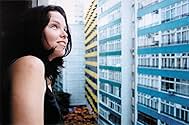Edifício Master
- 2002
- 1h 50min
VALUTAZIONE IMDb
8,3/10
1831
LA TUA VALUTAZIONE
Aggiungi una trama nella tua linguaThe daily lives and routine of 37 families living in a huge 12-story building in Copacabana, Rio de Janeiro: their drama, aspirations, intimate revelations, loneliness, dreams...The daily lives and routine of 37 families living in a huge 12-story building in Copacabana, Rio de Janeiro: their drama, aspirations, intimate revelations, loneliness, dreams...The daily lives and routine of 37 families living in a huge 12-story building in Copacabana, Rio de Janeiro: their drama, aspirations, intimate revelations, loneliness, dreams...
- Regia
- Sceneggiatura
- Star
- Premi
- 6 vittorie e 7 candidature totali
Recensioni in evidenza
My mother has a friend who has lived in Edifício Master for over 20 years. So I have been to the building several times over all these years, mostly during my childhood. I recently met her and we spoke about the movie. She hated that it was made, and refused to be interviewed. She also did not watch the movie herself. There is a big stigma associated to buildings like Ed. Master (there are a few like it in Copacabana, but not that many). There are even stories about buildings that had their street numbers changed, so bad the reputation they earned, always in connection with prostitution and drug dealing. What I like about the movie, is that it shows that it is true that prostitutes do live there, but also that everyone is a human being, with often complex feelings. It is interesting to see how important it was for several of those interviewed to live in Copacabana, a famous postcard from Rio. Almost all of those are not from Rio, which adds a little to the postcard effect. Copacabana is indeed a very diverse, I'd even say strange place. Many tourists, a lot of violence, many street-kids snorting glue, smoking dope, a huge number of prostitutes. Both female and male (mostly transvestites). The only thing I think was missing was a transsexual interviewee (I'm sure there are some living there).
The main reason I am writing this response is because I read Kevv's response. This piece isn't about the beach of Rio De Janeiro. The title contains Edificio...basically Edifice...Building. The film is about the people of a building. It beautifully explores the lives of common people. There are many reasons to see this film: understand that Copacobana may not be the glittering paradise people imagine it to be, have an insight into people's lives that are different or perhaps similar to yours, and enjoy humanity. I think this is the "Reality TV" Americans should spend a lot more time watching. I met the assistant director for this film, Cristiana Grumbach. She and Coutinho provide a great window of insight into Brazilian life. Though these people are a small representation of the entire population of Copacobana, their lives are rich with humanity.
I became a big fan of Coutinho, great documentaries, this one is amazing, so beautiful and familiar, people like us talking about random subjects inside a cluster of apartments, loneliness, robbery, suicide, dreams, past and future, and how they have passed 20 years I'm imagining and super curious to know how the real characters in this movie are doing... Beautiful, beautiful... Eduardo Coutinho will be missed...
This ever surprising documentary about the residents of a huge building located at Copacabana Beach, Rio de Janeiro, touches our very souls with the bitter-sweet stories of people (almost) like us. From the old couple always quarrelling about each other's idiosyncrasies to the young woman which sells her body but doesn't loose the girlish sparkles of her eyes, Coutinho takes us by hand on a trip over a very familiar, still astonishingly strange, place. Prepare yourself to laughs and cries.
Imagine it: The Human Network. Reality TV that actually has something to do with reality; that gets to the essence of how people are. Like a music video channel, except instead they show clips of everyday people from a building in Copacabana (or a farm in Kansas, or a kibbutz in Israel), each talking for two or five minutes about what makes them happy and what makes them not - you'd never run out of material; people could even send in their own tapes ("America's Humanest Home Videos"), although this would also give them the freedom to do useless things. There are no useless things here, although some moments are better than others: it was the expansion of the old stereotypes that really got to me - so this is how a hooker with a heart of gold feels about being one; and here's the sort of guy Sinatra sang "My Way" for. It's rather uncinematic, though - I wish they had found a way to edit the material into something denser, perhaps by organising it thematically. And there isn't that sense of the institution as an organism, that Frederick Wiseman would've evoked. Hence I don't know if what you see here is any more worthwhile than chatting to each of the other people in the theatre with you, but when did you last do that? The movie's moderately recommended, the TV channel idea is something you should urge Ted Turner to do.
Lo sapevi?
- ConnessioniFeatured in Eduardo Coutinho, 7 de Outubro (2013)
- Colonne sonoreMy Way
by Frank Sinatra
I più visti
Accedi per valutare e creare un elenco di titoli salvati per ottenere consigli personalizzati
Dettagli
- Tempo di esecuzione1 ora 50 minuti
- Colore
Contribuisci a questa pagina
Suggerisci una modifica o aggiungi i contenuti mancanti

Divario superiore
By what name was Edifício Master (2002) officially released in India in English?
Rispondi













